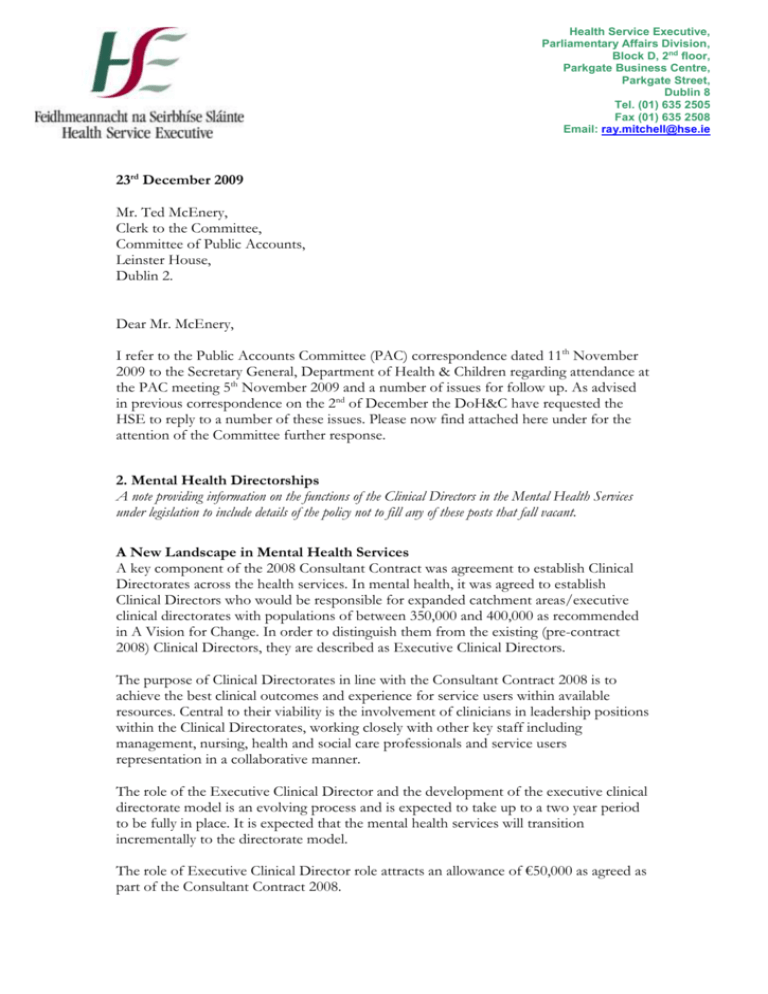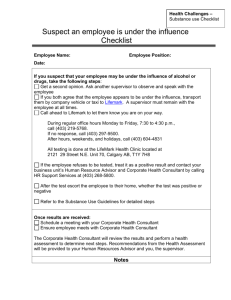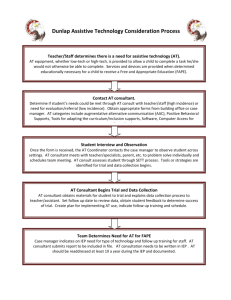PAC - Letter from Mr. Ray Mitchell dated 23 December 2009
advertisement

Health Service Executive, Parliamentary Affairs Division, Block D, 2nd floor, Parkgate Business Centre, Parkgate Street, Dublin 8 Tel. (01) 635 2505 Fax (01) 635 2508 Email: ray.mitchell@hse.ie 23rd December 2009 Mr. Ted McEnery, Clerk to the Committee, Committee of Public Accounts, Leinster House, Dublin 2. Dear Mr. McEnery, I refer to the Public Accounts Committee (PAC) correspondence dated 11th November 2009 to the Secretary General, Department of Health & Children regarding attendance at the PAC meeting 5th November 2009 and a number of issues for follow up. As advised in previous correspondence on the 2nd of December the DoH&C have requested the HSE to reply to a number of these issues. Please now find attached here under for the attention of the Committee further response. 2. Mental Health Directorships A note providing information on the functions of the Clinical Directors in the Mental Health Services under legislation to include details of the policy not to fill any of these posts that fall vacant. A New Landscape in Mental Health Services A key component of the 2008 Consultant Contract was agreement to establish Clinical Directorates across the health services. In mental health, it was agreed to establish Clinical Directors who would be responsible for expanded catchment areas/executive clinical directorates with populations of between 350,000 and 400,000 as recommended in A Vision for Change. In order to distinguish them from the existing (pre-contract 2008) Clinical Directors, they are described as Executive Clinical Directors. The purpose of Clinical Directorates in line with the Consultant Contract 2008 is to achieve the best clinical outcomes and experience for service users within available resources. Central to their viability is the involvement of clinicians in leadership positions within the Clinical Directorates, working closely with other key staff including management, nursing, health and social care professionals and service users representation in a collaborative manner. The role of the Executive Clinical Director and the development of the executive clinical directorate model is an evolving process and is expected to take up to a two year period to be fully in place. It is expected that the mental health services will transition incrementally to the directorate model. The role of Executive Clinical Director role attracts an allowance of €50,000 as agreed as part of the Consultant Contract 2008. The role of the Executive Clinical Director on appointment and during the Transition Phase The term Executive Clinical Director is applied in this document to the role and function of Clinical Director which is outlined in Appendix 4 of the Consultant Contract 2008 and which, for the avoidance of confusion, is denoted as Executive Clinical Director for the purposes of the mental health services to distinguish it from the function and role of the Clinical Director which was in place in the mental health services prior to the finalisation of the Consultant Contract 2008 and which is recognised under the Mental Health Act, 2001. Appendix 4 of the Consultant Contract 2008, describes a Clinical Director working within a Clinical Directorate. As this term was already in use within the mental health services, albeit describing a different role, it has been necessary to append the term Executive to describe the new role arising from Appendix 4. The introduction of the clinical directorate model incorporating executive authority for the Executive Clinical Director is one of the most significant changes to occur in the Irish Healthcare Service for many years. Within the mental health services, the development of the role of Executive Clinical Director and the related clinical directorate will provide a pivotal point to drive service quality and the implementation of the recommendations of A Vision for Change. The first Executive Clinical Directors will provide leadership and shape the direction of the mental health services within their expanded catchment area. A significant change arising from the Consultant Contract 2008, is that all existing Clinical Directors and Consultant Psychiatrists (who have signed the new Consultant Contract 2008) will now report to the Executive Clinical Director. Where, during the Transition phase, an existing Clinical Director post falls vacant by resignation or retirement or any other reason, or where there is a pre-existing vacancy when the Executive Clinical Director is appointed, it is expected that the Executive Clinical Director will assume the responsibilities of the post. This is currently the subject of further discussion with the Executive Clinical Directors having regard to local circumstances in their geographical area. The Executive Clinical Directors are engaging with the assigned Local Health Manager with a view to agreeing how best to reduce their clinical workload to enable them to actively work on their new responsibilities and to provide them with some administrative support in the short term. Reassignment of the Executive Clinical Director’s clinical workload is to be achieved within existing resources. The Executive Clinical Director role attracts an allowance of €50,000 in addition to the consultant salary. The role of the existing Clinical Director The term existing Clinical Director is applied in this document to the role and function of Clinical Director which existed in the mental health services prior to the agreement on the Consultant Contract 2008 and which included the functions ascribed to Clinical Director under the Mental Health Act, 2001. This role and function was specifically recognised as being in existence prior to the finalisation of the Consultant Contract talks and was specifically considered as part of the agreement to be continuing as a role for the duration of the term of office of the incumbents, whether appointed or acting, at the time of the agreement of the Consultant Contract, 2008. This specific role and the functions and remuneration associated with it should not be confused with the role of Clinical Director outlined in appendix 4 of the Consultant Contract which, for the avoidance of confusion, is denoted as Executive Clinical Director for the purposes of the mental health services. Each Approved Centre must have a Proprietor and a Clinical Director as defined in the Mental Health Act, 2001. It is the responsibility of the Proprietor to advise the Mental Health Commission if the notified Clinical Director changes. While existing notified Clinical Directors remain in place it is not the intention to change that position. All of the responsibilities described in the Mental Health Act, 2001 as applying to the existing Clinical Director continue as before. Where, during the transition phase, an existing Clinical Director post falls vacant by resignation or retirement or any other reason, the Executive Clinical Director is expected to assume these responsibilities. It should be noted that the most immediate of the legal responsibilities within the Mental Health Act, 2001 rest with the Consultant Psychiatrist with a specific number of additional responsibilities reserved to the Clinical Director as follows (this is not intended to be an interpretation of the legislation): Section 71, Mental Health Act 2001 – Appointment of a Clinical Director of an Approved Centre. Sections 20, 21,22, Mental Health Act, 2001 – Application for Transfer and Arrangements for the transfer of patients Section 27, Mental Health Act, 2001 – Absence without leave Section 62, Health (Miscellaneous Provisions), Act, 2009 Amendment of Mental Health Act, 2001, section 71A – Removal of persons and bringing back of patients to approved centres by authorised persons or by relevant persons. Following the initial appointment of the first group of Executive Clinical Directors in accordance with the Consultant Contract 2008, the role of the existing Clinical Director in all its facets will continue. This follows the full consideration of the statutory function of the role within the context of the Consultant Contract talks and the agreement that the role should continue in full while the current postholder remains in post. According to the terms of the Consultant Contract, 2008, all consultant psychiatrists and existing clinical directors will report to the new Executive Clinical Director on acceptance of their appointment. Where there are existing Clinical Directors who have not signed the Consultant Contract 2008, their reporting relationships remain with line management and their role and functions remain as outlined above. They are however expected to work in collaboration with the Executive Clinical Director in the delivery of mental health services within the expanded catchment area. The allowance, in addition to salary, paid to the Clinical Director for carrying out this function is the equivalent of two sessions or €37,000 approx. If you require any clarification on this, please do not hesitate to contact me. Yours sincerely, ---------------------------------Ray Mitchell Head of Parliamentary Affairs Division




